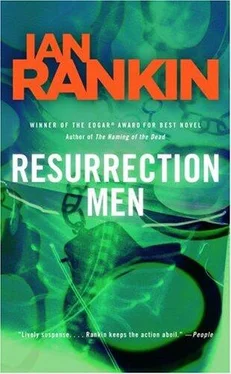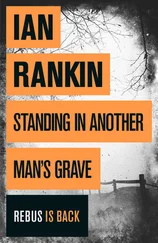Then a fist rapped on the other side of the door, and Rebus let it swing open again.
“Getting all cozy in here?” Bobby Hogan said. “I’ll have no goldbricking on my shift.”
“Just conferencing,” Jazz McCullough said, face and voice suddenly back to normal. Gray had his own face lowered, pretending to adjust his necktie. Hogan looked at the three men, knowing something had been going on.
“Well,” he said, “conference your arses out of here and back to what we in the human world call work. ”
The human world. . . Rebus wondered if Hogan would ever know how close to the mark he’d been. In this room, for a matter of seconds, three men had been reconciled to acting like something less than human . . .
“Sure thing, DI Hogan,” Jazz McCullough said, picking up his folder and readying to leave the office. Gray’s eyes caught Rebus’s, and Rebus could see the man was having a hard time pulling himself back. It was like watching Edward Hyde decide he no longer needed Henry Jekyll. Rebus had told Jazz that there was still the chance for resurrection, but not in Francis Gray’s case. Something had died behind his eyes, and Rebus didn’t think he’d be seeing it again.
“After you, John,” McCullough was saying with a sweep of his arm. As he followed Hogan out of the room, Rebus could feel a tingling all down his spine, as though a blade were about to lodge itself there . . .
There was a tapping at Siobhan’s window. It took her a moment to work out where she was: the St. Leonard’s car park. She must have driven there from Leith; couldn’t remember anything about it. How long had she been sitting? It could have been half a minute or half an hour. More tapping. She got out of the car.
“What’s up, Derek?”
“Shouldn’t that be my question? You’re sitting there like you’ve seen a ghost.”
“Not a ghost, no.”
“What then? Has something happened?”
She shook her head, as if trying to clear it of the memory of that office . . . Gray and McCullough . . .
Rebus had warned her, and she’d gone blundering in anyway with her sweeping accusations and half-formed questions. It was hardly what they taught you at Tulliallan. Even so, the reactions of McCullough and Gray had been startling: McCullough’s sudden anger, Gray’s snarling defense of his colleague. She’d expected a response, yes, but nothing quite so feral. It was as if the two men had been unraveling in front of her eyes.
“I’m fine,” she told Linford. “Just in a dream, that’s all.”
“Sure?”
“Look, Derek . . . ” Her voice had hardened. She rubbed at a throbbing spot on her right temple.
“Siobhan . . . I am trying to mend the fence between us.”
“I know you are, Derek. But this isn’t the time, okay?”
“Okay.” He held up both hands in surrender. “But you know I’m there for you if you need me.” She managed to nod her head. He shrugged, prefacing a change of subject. “Friday night tonight. Shame you’ve got that date. I was going to suggest dinner at the Wichery . . .”
“Another time maybe.” She couldn’t believe she was saying this. I don’t want to make any more enemies . . . Linford was smiling.
“I’ll hold you to that.”
She nodded again. “I have to go to the office now . . .”
Linford checked his watch. “I’m out of here. Might be back before the close of play. Otherwise, have a great weekend.” He seemed to think of something. “Maybe we could do something together.”
“I need a bit more notice than that, Derek.” The throbbing was getting worse. Why wouldn’t he just go? She turned and walked towards the station’s rear door. He’d be standing there . . . watching her . . . waiting for her to turn so he could try out another sympathetic smile.
No chance.
Upstairs in the murder room, things were winding down. The team had been given the weekend off en masse. The Procurator Fiscal’s office was happy enough with the case as it stood. They’d have more questions, more information they needed come Monday morning. But for now, everyone was relaxing. There was still paperwork to contend with, still loose ends to be gathered together and tied as tight as possible.
It could all wait till Monday.
Siobhan sat at her desk, staring at the cover sheet of the Dundee fax. When she looked up, Hynds was moving in her direction. She could see by the look on his face that he was going to ask if anything was wrong. She held up a finger, warning him off. He stopped, shrugged and turned away. She started reading the text of the fax one more time, willing something — anything — to jump out at her. She supposed she could try talking to Ellen Dempsey, see if she’d let anything slip.
So what? she wondered. What difference did it make if McCullough did connect to Ellen Dempsey? It certainly seemed to make a difference to him. She knew almost nothing about McCullough and didn’t have any contacts in Dundee who could enlighten her. Then she turned back to the cover sheet.
To: DS Clarke, Lothian and Borders
From: DS Hetherington, Tayside
Hetherington . . . a detective sergeant, just like her. Siobhan’s request hadn’t been addressed to any particular officer. She’d just got the fax number for Tayside Police HQ and sent it there. The cover sheet was on letterhead, the telephone number just discernible. Then she noticed something typed below Hetherington’s name: x242. Had to be an extension number. Siobhan picked up her phone and punched the digits.
“Police HQ, DC Watkins,” the male voice said.
“It’s DS Clarke here, St. Leonard’s in Edinburgh. Any chance I could have a word with DS Hetherington?”
“She’s not in the office right now.” She . . . A smile cracked open Siobhan’s face. “Can I take a message?”
“Is she likely to be back?”
“Hang on a sec . . .” There was the sound of the receiver being laid down on a desktop. DS Hetherington was a woman. It gave them something in common, might make it easier for the pair of them to talk . . . The receiver was picked up again. “Her stuff’s still here.” Meaning she’d be back to pick it up.
“Could I leave you a couple of numbers to pass on to her? I’d really like to talk to her before the weekend.”
“Shouldn’t be a problem. We have to prize her out of the office usually.”
Better and better, thought Siobhan, giving Watkins her St. Leonard’s and mobile numbers. Afterwards, she stared at the telephone, willing it to ring. The room around her was emptying: early doors, as Rebus would have called it. She hoped he was all right. She didn’t know why she hadn’t called him . . . Actually, she had a vague memory of doing just that. Probably as soon as she’d got back to her car. But he hadn’t been answering. She tried him again now. He picked up.
“I’m fine,” he told her without preamble. “I’ll talk to you later.” End of conversation.
She visualized Hetherington returning to her desk . . . maybe not noticing the message. Watkins hadn’t sounded the type who had to be prized from anything but a barstool. What if he’d already made his escape before her return? What if she saw the message but was too tired to do anything about it? Maybe she’d had a long week . . . To Siobhan, it had lasted an eternity. She wasn’t going to do anything this weekend but lie in bed and read, doze, then read some more. Maybe drag the duvet as far as the sofa and watch a black-and-white film. There were CDs she hadn’t got round to playing: Hobotalk, Goldfrapp . . . She’d decided to give the football a miss. It was an away game at Motherwell.
The phone remained silent. Siobhan counted to ten, giving it a chance, then gathered her stuff and headed for the door.
Читать дальше












